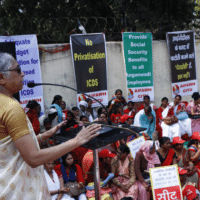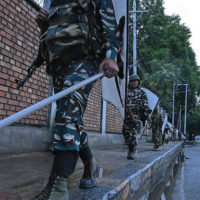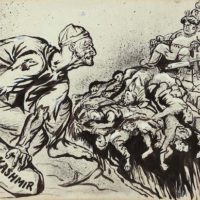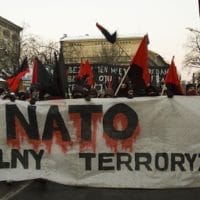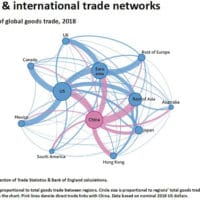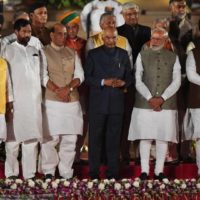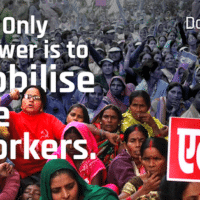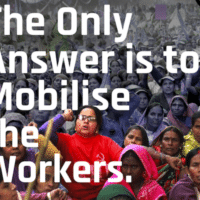-
Navigating Educational Empowerment Through Life Conditions: A Study of Rural Women in Indian Punjab
Though the voices of rural women in India are some of the least heard, they are not mere passive victims. Many rural women strongly condemn their marginalization and pauperization—highlighting the flawed and biased developmental polices of the state, which they hold largely responsible for their hardships.
-
Victims left behind in U.S. Agent Orange cleanup efforts
Vietnamese victims have yet to receive compensation–and many live in desperate poverty.
-
Kashmir on the edge of the abyss
Tariq Ali on the situation in Kashmir.
-
Outsourcing exploitation: global labor-value chains
Through their control over supply chains, multinationals based in the global north exploit workers in the global south.
-
History often proceeds by jumps and zig-zags
The main conflict here – since the 1940s – has been between India and Pakistan. Disagreements are deeply rooted in the political culture of each country. The rise of the far right in India has only inflamed the conflict further.
-
Why Kashmir is suddenly a potential global point of conflict
Before India’s Home Minister Amit Shah introduced the Jammu and Kashmir Reorganization Bill in the Indian Parliament, his government sent tens of thousands of Indian troops into Kashmir. There is no official number, but it is often said that there are nearly 600,000 Indian troops in the state. That a population of 12 million people needs this kind of armed action suggests that they are an occupied people.
-
Don’t believe the hype about the ‘rules-based order’, capitalism is perpetual war
Why is war, or the threat of it, a permanent feature of our society? The most common answers point to contingencies–the psychology of particular world leaders, for example, or the specific gains to a company to be made from a conflict. Alternatively, they rely on universal claims that religion causes eternal strife or that conflict is part of our human nature.
-
NATO’s China Double-Think by Finian Cunningham + Neoliberalism Has Met Its Match in China by Ellen Brown
We cannot win a currency war by competitive currency devaluations that trigger a “race to the bottom,” and we cannot win a trade war by competitive trade barriers that simply cut us off from the benefits of cooperative trade. More favorable to our interests and values than warring with our trading partners would be to cooperate in sharing solutions, including banking and credit solutions.
-
China & World trade
Just in case you had forgotten that China is a major part of the global economy, here is a chart from the Bank of England’s Financial Stability Report.
-
Is India displaying signs of neo-fascism?
Property rights of people are protected under neo-fascism, except those racially, communally, sexually, or politically targeted whose properties are often confiscated.
-
At least 6 people killed in mob lynching incidents in Bihar in past week
Not just that, a dozen more incidents of mob violence have also been reported in which people were attacked, thrashed, injured, abused and humiliated by mobs for alleged crimes or no crimes in some cases.
-
A conversation with Aijaz Ahmad: ‘The state is taken over from within’
Aijaz Ahmad argues that the Rashtriya Swayamsewak Sangh (RSS) and its fronts, including the Bharatiya Janata Party (BJP), display distinct fascistic characteristics, but the Indian state continues to live by the liberal playbook, no matter how hollow the Indian liberal institutions may have become. He anchors this proposition in a distinctive theoretical position.
-
Fukushima: an ongoing disaster
n March–on the eighth anniversary of the Fukushima disaster–Time magazine published an article with the headline: “Want to Stop Climate Change? Then It’s Time to Fall Back in Love with Nuclear Energy”.
-
For the reasons that follow, that Country is currently not likely to be the United States
The largest delegation from outside Russia at the St. Petersburg International Economic Forum in early June came from China.
-
Why Trump caved to China and Huawei
Everything about the trade war between the United States and China is bewildering. Truces would come out of nowhere but then they would be set aside by U.S. President Donald Trump in a stream of tweets at odd hours. Regardless, Huawei and China are unlikely to blink. They have the upper hand.
-
The debate over inequality
The debate over inequality has become hotter world-wide. While Trump had introduced substantial tax cuts for the rich in 2017, and Britain’s Boris Johnson, the front-runner to succeed Teresa May, has promised to do the same if he becomes Prime Minister, there are strong proposals for taxing the rich which have also been mooted. Bernie Sanders had such a proposal for the U.S. during the time that he was seeking the Presidential nomination of the Democratic Party.
-
Religion is the sigh of the oppressed creature
On the one hand, people who spend most of their time working develop an understanding of the ‘practical transformation of the world’. This framework is implicit in the workers’ activity, since the worker–given the theft of their time–is often prevented from having a ‘clear theoretical consciousness of this practical activity’.
-
‘In India, it’s pathological authoritarianism’
That raises a whole range of very familiar and long-standing issues that have afflicted the Left, leading to debates in India (and no doubt in other places as well) between the organised Left and what has come to be called the “ultra-Left” and the insurgent Left.
-
Dossier 18: The only answer is to mobilise the workers
Tricontinental: Institute for Social Research launches its eighteenth dossier, “The Only Answer Is to Mobilize the Workers.” The challenges facing Indian workers and their strategies to fight back are explained through the insights and expertise of K. Hemalata, president of the Center of Indian Trade Unions (CITU).
-
Marx and the Dutch East India Company
In the final part of Capital, Volume I on “the so-called original accumulation”, Marx gives a dazzling overview of the often violent historical phenomena that contributed to the birth of the capitalist system, “dripping from head to foot, from every pore, with blood and dirt.”

